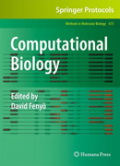
Computational biology is an interdisciplinary field that applies mathematical, statistical, and computer science methods to answer biological questions, and its importance has only increased with the introduction of high-throughput techniques such as automatic DNA sequencing, comprehensive expression analysis with microarrays, and proteome analysis with modern mass spectrometry. In Computational Biology, expert practitioners present a broad survey of computational biology methods by focusing on their applications, including primary sequence analysis, protein structure elucidation, transcriptomics and proteomics dataanalysis, and exploration of protein interaction networks. As a volume in thehighly successful Methods in Molecular Biology™ series, this work provides the kind of detailed description and implementation advice that is crucial for getting optimal results. Authoritative and easy to use, Computational Biology is an ideal guide for all scientists interested in quantitative biology. Presents a broad survey of computational Biology methods by focusing on their applications -Aids scientists in building the foundation to the eventual goal of modeling complex Systems like an entire cell -Includes detailed descriptions of techniques provided by key experts from around the world INDICE: Sequencing and Genome Assembly Using Next-Generation Technologies.- RNA Structure Prediction.- Normalization of Gene-Expression Microarray Data.- Prediction of Transmembrane Topology and Signal Peptide Given a Proteins Amino Acid Sequence.- Protein Structure Modeling.- Template-Based Protein Structure Modeling.- Automated Protein NMR Structure Determination in Solution.- Computational Tools in Protein Crystallography.- 3-D Structures of Macromolecules Using Single Particle Analysis in EMAN.- Computational Design of Chimeric Protein Libraries for Directed Evolution.- Mass Spectrometric Protein Identification Using the Global Proteome Machine.- Unbiased Detection of Post Translational Modifications Using Mass Spectrometry.- Protein Quantitation Using Mass Spectrometry.- Modeling Experimental Design for Proteomics.- A Functional Proteomic Study of the Trypanosoma brucei Nuclear Pore Complex: An Informatic Strategy.- Inference of Signal Transduction Networks from Double Causal Evidence.- Reverse Engineering Gene Regulatory Networks Related to Quorum Sensing in the Plant Pathogen Pectobacterium atrosepticum.- Parameter Inference and Model Selection in Signaling Pathway Models.- Genetic Algorithms and Their Application to In silico Evolution of Genetic Regulatory Networks.
- ISBN: 978-1-60761-841-6
- Editorial: Humana
- Encuadernacion: Cartoné
- Páginas: 330
- Fecha Publicación: 29/09/2010
- Nº Volúmenes: 1
- Idioma: Inglés
